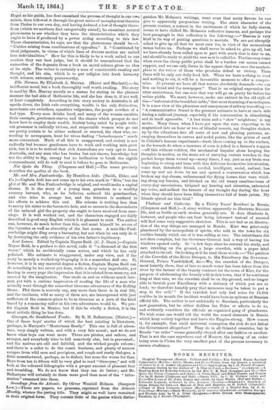Soundings from the Atlantic. By Oliver Wendell Holmes. (Sampson Low.)--These
are papers, we presume, reprinted from the Atlantic 3fonthly, whence the jesting title. They might as well have remained in their original form. They contain little of the genius which distin- guishes Mr. Holmes's writings, want even that nutty flavour he can give to apparently purposeless writing. The stern character of the present contest, a contest in the excitement of which he fully shares, seems to have chilled Mr. Holmes's reflective humour, and perhaps the best paragraph in this collection is the following :—" Heaven is very kind in its way of putting questions to mortals. We are not abruptly asked to give up all that we most care for, in view of the momentous issues before us. Perhaps we shall never be asked to give up all, but we have already been called upon to part with much that is dear to us, and should be ready to yield the rest as it is called for. The time may come when even the cheap public print shall be a burden our moans cannot support, and we can only listen in the square that was once the market- place to the voices of those who proclaim defeat or victory. Then there will be only our daily food left. When we have nothing to read and nothing to eat, it will be a favourable moment to offer a compro- mise. At present we have all that nature absolutely demands—we can live on bread and the newspaper." That is an original expression for utter earnestness, but one sees that war will go on pretty far before the writer yields. We must, however, make ono extract in the old style of the—"autocrat of the breakfast-table," that most charming of monologues. It is a new view of the pleasures and annoyances of railway travelling :— " A communicative friend is the greatest nuisance to have at one's side during a railroad journey, especially if his conversation is stimulating and in itself agreeable. A fast train and a " slow " neighbour,' is my motto. Many times, when I have got upon the cars, expecting to bo magnetized into an hour or two of blissful reverie, my thoughts shaken up by the vibrations into all sorts of new and pleasing patterns, ar- ranging themselves in curves and nodal points, like the grains of sand in Chladni's famous experiment—fresh ideas coming up to the surface, as the kernels do when a measure of corn is jolted in a farmer's waggon —all this without volition, the mechanical impulse alone keeping the thoughts in motion, as the mere act of carrying certain watches in the pocket keeps them wound up—many times, I say, just as my brain was beginning to creep and hum with this delicious locomotive intoxication, some dear, detestable friend, cordial, intelligent, social, radiant, has come up and sat down by me and opened a conversation which has broken my day-dream, unharnessed the flying horses that were whirl- ing along my fancies, and hitched on the old weary omnibus-team of every-day associations, fatigued my hearing and attention, exhausted my voice, and milked the breasts of my thought dry during the hour when they should have been filling themselves full of fresh juices. My friends spared me this trial."


































 Previous page
Previous page